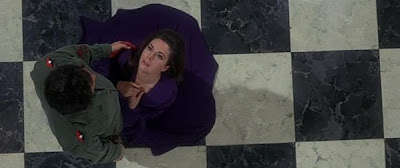Topaz (1969)
d. Alfred Hitchcock / USA / 143 mins.
There's a part of me that is sympathetic to the notion that a mediocre film from Alfred Hitchcock is still better than most other films. I'm guilty of extending that analysis to a few films that I recognize as interesting only because I bring to them a love, knowledge, and admiration of Hitchcock. If my views on some of his films are slightly inflated due to my interest in the man and his art, don't take that to believe that I think all of his films are above reproach. He made his share of bad movies, and a painful clunker like Topaz is particularly in need of some yellow police tape and a caution to stay away at nearly all costs.
Reeling from the relative catastrophe that was Torn Curtain, Hitchcock climbed back onto the spy thriller bandwagon with Topaz, released three years later and after much reflection on the director's part. It's disappointing that this film fails in virtually every way Torn Curtain did: bloated and overlong, lacking a central and cohesive theme, victim to its scattershot pacing and suffering from an absence of any thrills. Like the previous film, Topaz contains a few moments worth the Hitchcock name, but most of what we consider to be the director's hallmarks, from the narrative to the stylistic, are curiously absent. By the denouement, there is perhaps only a single shot that might stick with you in the coming days. If you were to dust Topaz for fingerprints, you might not turn up any of Hitchcock's.
It's not surprising how things could never quite come together for Topaz. The first draft of the script was written by Leon Uris, who adapted his own novel into something Hitchcock believed was impossible to film. To salvage Uris' script, the director turned to Samuel Taylor, who had delivered a delicately psychological and rich layered detective story for Vertigo; but even if Taylor's finished script is twice as good as Uris's, then I think that says more about how awful the first draft must have been. This is the director's longest film, and it feels like it. Although the plot could have been developed into something substantial, there are missed opportunities from start to finish, and what is too convoluted at first turns too simplistic in the end. (Far too simplistic, if you ask me, but Hitchcock was put in the corner by the studio after the original ending didn't test well. He shot three possible endings, and what made it onto the film is the least offensive, although that's hardly praise.)
Set against the Cuban Missile Crisis, two spies — one American (John Forsythe) and one French (Frederick Stafford) — are working together to help bring down a global network. There is some general international intrigue, including attention paid to the beautiful Juanita (an under-valued Karin Dor), mistress to the French agent who is also involved with a Castro-lookalike (John Vernon). But the affairs of men and governments is not woven together with any intricacy by Hitchcock, whose Notorious is among the best films to explore the murky line between love and duty. Perhaps you, like me, are occasionally willing to let something of depth and nuance slide in exchange for excitement and action, but Topaz lacks those latter elements as well (largely attributed in some circles to that its fact leading men are bland and its only alluring character, Dor's Juanita, disappears all too swiftly; even Torn Curtain, for all its shallowness, had Paul Newman, for God's sake). More damning than the lack of psychological exploration is the fact that even the Cuban Missile Crisis itself feels flat and astonishingly drab, and when you have a director that can send you to the edge of your seat as two characters search for a wine bottle, flubbing the brink of nuclear annihilation does not bode well for the film at large.
In addition to being Hitchcock's longest film, it was also his most expensive (and his biggest commercial flop). His team had fully dissolved, and Hitchcock knew he had another dud on his hands. The seams show where he tried to fix what he could see was too gone to rescue. With its foray into Cuba as well as on-location shooting in Harlem and Copenhagen, Topaz attempted to correct the bland Eastern European tourism of Torn Curtain by taking its characters to exotic locales; but the promise of exoticism is never paid off.
Then there's a simple matter of mechanics. Typically Hitchcock rewards his audience with something of value in almost every scene, but for Topaz only two moments are noteworthy. The first, a rather superb moment involving the theft of a red briefcase belonging to Cuban militants, I'd nearly forgotten about until I went back through my notes. The second, however, has stayed with me since I first saw the film. In the moment of Juanita's death (see above in the accompanying still), the camera flows into a bird's-eye view angle and captures Dor's purple dress flowing out from underneath her with the liquidity of oozing blood. Such a moment is proof Hitchcock wasn't finished yet, but for one stupendous shot to come in the vast expanse of 142 minutes is be drowned in a sea of problematic filmmaking.






1 comments:
And even that shot, striking as it may be, looks more like something out of an Argento movie than anything in his work prior to this. I'm always puzzled by how little Hitchcock's last few films feel like Hitchcock.
Post a Comment